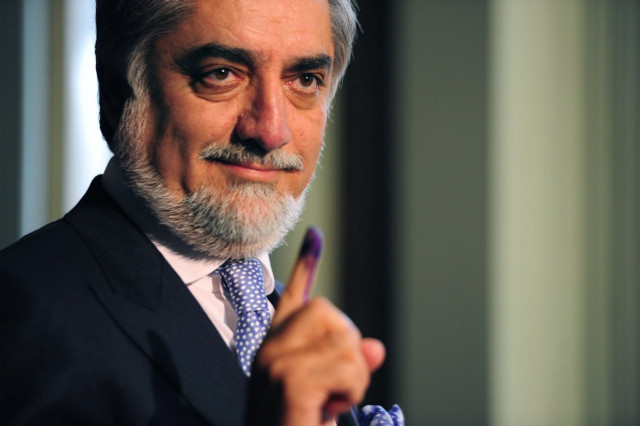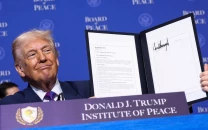Pak-Afghan circles dismiss qualms about Abdullah’s background
With the highest number of votes in recent elections, the presidential hopeful is likely to win in decisive round two.

Former Afghan defence minister, Shahnawaz Tanai, does not agree with the notion that Abdullah will oppose Pakistan solely on the basis of his ethnicity. PHOTO: AFP
Some circles in Pakistan are upset that ethnic Pukhtun Hamid Karzai will likely be replaced by the half-Tajik Abdullah, who was closely associated with the Northern Alliance. However, concerned Pakistani officials have a different approach and insist they would not have any problems with a non-Pukhtun leader, highlighting the country’s tense relationship with Karzai during his nearly 13-year rule.

With Abdullah garnering the most votes in the April 5 elections, he will face runner-up Dr Ashraf Ghani in the second and decisive round of polls in about a month’s time.
Senior Afghan and Pakistani political leaders also disagree with the perception and insist some quarters continue to live in the past and have not seen a tangible change in the public mindset on both sides.
Former Afghan defence minister, Shahnawaz Tanai, does not agree with the notion that Abdullah will oppose Pakistan solely on the basis of his ethnicity and whoever thinks so probably has personal interests at heart.
“Afghanistan has gone through a critical transformation over the past decade where no ethnic group in general is opposed to good relations with Pakistan.
Whoever is defining the relationship on an ethnic basis is doing so for vested interests,” Tanai told The Express Tribune by phone from Kabul on Friday.
Tanai, who also served as the army chief during the communist regime of Dr Najibullah and now leads a political movement, said opponents of better bilateral relations exist both in Pukhtun and Tajik communities but they do not represent the majority’s sentiments.
The same sentiments were echoed by Pakistani Senator Mushahid Hussain Sayed, who insisted that ‘concerns’ about Abdullah were not well-founded.
“Abdullah is somebody with whom Pakistan can do business with by opening a new chapter, should he be elected president,” Mushahid, who is also chairman of the Senate Defence Committee, told The Express Tribune on Friday.
“Let us approach Afghanistan with an open mind and not be hostage to the mindset and assumptions of the past, which, in any case, have been proven wrong,” he said.
Recalling his past meetings with Abdullah, Mushahid said, “We have had detailed sessions on relations between the two countries and I found him to be a good, sincere person who feels Pakistan’s friendship is indispensable for Afghanistan.”
Just a few months after then Ambassador Muhammad Sadiq was appointed Pakistan’s envoy to Afghanistan in 2009, he travelled to Panjshir Valley in Northern Afghanistan to offer condolences for slain Northern Alliance leader Ahmad Shah Massoud, who had been known for his anti-Pakistan stance. The visit to Massoud’s mausoleum was seen as a clear indication of Pakistan’s quest to have a broad-based relationship with non-Pukhtun communities in Afghanistan.
Similarly, Northern Alliance leaders, who had been critical of Pakistan in the past, now have a different approach and Abdullah himself promised cordial relations with Pakistan when he recently received Islamabad’s new ambassador Abrar Hussain at his residence.
Pakistan’s two major concerns are the Durand Line and access to the Central Asian states through Afghanistan for greater trade.
As Pakistan deals with the Afghan government over transit trade with Central Asia, it needs to have working relations with all the communities in Afghanistan, especially non-Pukhtun ones that are located on the country’s northern region bordering several Central Asian states.
It will be challenging for Pakistani authorities to deal with all the political and ethnic sides of Afghanistan, keeping in mind past relations between the two neighbours and the role of non-state actors.
Published in The Express Tribune, May 3rd, 2014.



















COMMENTS
Comments are moderated and generally will be posted if they are on-topic and not abusive.
For more information, please see our Comments FAQ